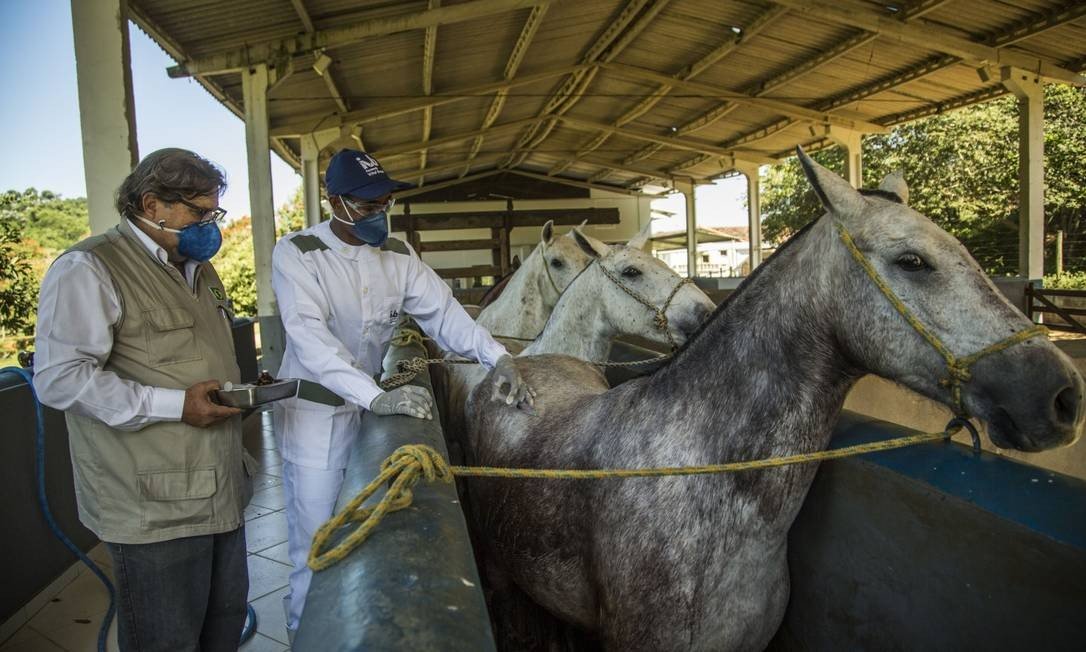RIO DE JANEIRO, BRAZIL – To trigger Covid-19, the SARS-CoV-2 virus infects lung cells and other organs through a protein that binds to a receptor. This portion of the virus (the receptor-binding domain – RBD) has been injected by Argentinean scientists into horses, which produced high doses of antibodies with the ability to neutralize the virus’ penetration into the cells, as evidenced in in-vitro studies.
After being approved by the Argentine regulatory agency (ANMAT), hyperimmune equine serum began to be administered this week in a clinical trial in hospitalized Covid-19 patients in Buenos Aires. The trial authors hope that the results, to be released in October or November, will provide a new therapeutic treatment against the pandemic disease.
“Equines are a biofactory. With very few horses one can collect plenty of serum”, stressed Fernando Goldbaum, Inmunova’s scientific director and Conicet researcher, in an online meeting with foreign correspondents. “The efficacy of hyperimmune serum in stopping the entry of the coronavirus into cells is 50 times greater than plasma [from convalescents],” Goldbaum said, based on his laboratory research. The other main advantage, he points out, is that there is no need for donations by Covid-19 recovered patients, as the material is extracted from animals.

Approximately one month after injecting the recombinant protein of SARS-CoV-2 in horses and obtaining an immune reaction, the plasma is extracted from the animals’ blood. The antibodies are then submitted to a purification and processing procedure to extract the high purity fragments that are used in the treatment now being tested.
According to Inmunova’s head of clinical research, Mariana Colonna, 242 Covid-19 patients in moderate or severe condition – but without the need for respiratory assistance or admitted to ICUs – will voluntarily take part in the trial in some 20 hospitals in Greater Buenos Aires. Patients will be administered two doses of hyperimmune serum: one at the time of diagnosis and the other 48 hours later after it has been proven that there is no allergic reaction or other serious side effects. The clinical trial will run for 28 days, specified Colonna.
The researchers believe that the hyperimmune serum will help reduce viral replication and, consequently, it is expected to deter the deterioration of the patient’s condition and prevent the need for ICU admission. In addition, they expect that the body will be able to develop its own immune response to the coronavirus, during the two weeks in which it will be protected by the injected antibody fragments.
Hyperimmune sera have been produced for decades, in particular as antidotes to snake and scorpion venoms. According to Goldbaum, his team was able to proceed quickly with the authorization for clinical trials to treat Covid-19 because when the pandemic emerged they were already working with this technique against hemolytic-uremic syndrome. A Costa Rican and a Brazilian company are also working on the development of similar therapies, according to Goldbaum.
If successful, the hyperimmune serum could be produced on a large scale, with tens of thousands of doses available before the end of the year, according to Linus Spatz, director of Inmunova, a company owned by the Insud group’s chemical-pharmaceutical conglomerate.
Since the start of the pandemic, Argentina has dedicated a large share of its scientific resources to Covid-19 research. Infectologist and pediatrician Fernando Polack heads a clinical trial on convalescent plasma, virologist Andrea Gamarnick leads the team that developed the first national serological tests to detect the presence of antibodies in the blood, and biologist Adrián Vojnov is leading the Argentinean scientists that created the first rapid diagnostic test for the SARS-CoV-2 virus, with a faster and simpler technology than the PCR.
Source: El País

